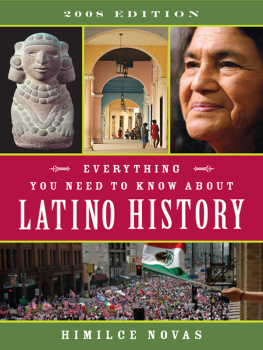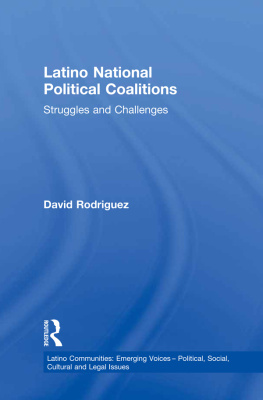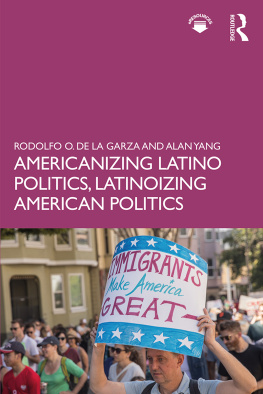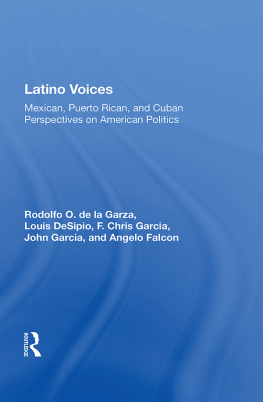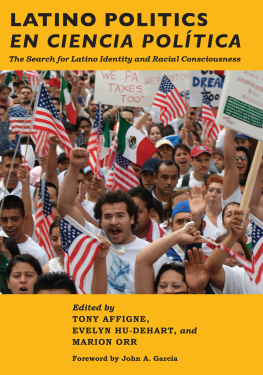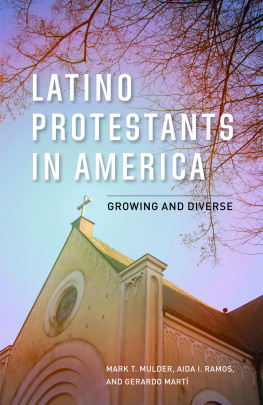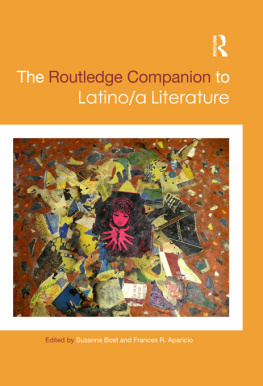For Ileana, David, and Daniel, and for Janet
First published 1996 by Westview Press
Published 2018 by Routledge
711 Third Avenue, New York, NY 10017, USA
2 Park Square, Milton Park, Abingdon, Oxon OX14 4RN
Routledge is an imprint of the Taylor & Francis Group, an informa business
Copyright 1996 Taylor & Francis
All rights reserved. No part of this book may be reprinted or reproduced or utilised in any form or by any electronic, mechanical, or other means, now known or hereafter invented, including photocopying and recording, or in any information storage or retrieval system, without permission in writing from the publishers.
Notice:
Product or corporate names may be trademarks or registered trademarks, and are used only for identification and explanation without intent to infringe.
A CIP catalog record for this book is available from the Library of Congress.
ISBN 13: 978-0-8133-3012-9 (pbk)
ISBN 13: 978-0-8133-8910-3 (hbk)
Contents
PART ONE
NATIONAL OVERVIEW
Rodolfo O. de la Garza and Louis DeSipio
PART TWO
THE OLD RELIABLES: MEXICAN AMERICANS IN SMALL WESTERN STATES
F. Chris Garca
Rodney E. Hero
Manuel Avalos
PART THREE
THE MUST-WINS: KEY STATES WITH LARGE LONG-TERM LATINO ELECTORATES
Valerie J. Martnez
Fernando Guerra and Luis Ricardo Fraga
PART FOUR
THE NEW KIDS ON THE BLOCK: KEY STATES WITH NEW AND POTENTIALLY INFLUENTIAL LATINO ELECTORATES
Roberto Key
Dario Moreno and Christopher Warren
Angelo Falcn
Bruce E. Cain
At the start of each new presidential election cycle, political reporters engage in the ritual of writing background stories about the American electorate. In recent years, these include articles about the potential political influence of the Latino community. Will Latinos finally wield the kind of influence in the upcoming election that their population numbers suggest they should have, they ask, or is this the year that the Republican party will make significant inroads into the Latino vote? Often, the press looks to party operatives and political consultants for answers to these questions, and the professionals, ever mindful that expectations matter greatly in politics, spin their responses with careless disregard for the evidence of recent history.
In fact, the best answers to these questions lie in the results of the last couple of elections. While normal electoral patterns occasionally undergo sweeping and dramatic political shifts due to extraordinary events, major crises, or charismatic individuals, change tends more typically to be evolutionary and incremental. Fortunately for political scientists, groups and interests show remarkable continuity in their behavior over time even when individuals act less predictably. Recent history, it turns out, does contain lessons for those who are willing to learn.
The value of this volume and its predecessors is that they establish a historical record about Latinos and national elections that enables us to distinguish between constant and variable behavior from one election to the next. Also, instead of the projective spin that political operatives offer, the scholars in this volume have tried very carefully and dispassionately to determine precisely how influential Latinos were in the 1992 election.
There is much useful descriptive detail in the pages that follow, but at the same time, all of the authors have tried to do more than simply detail what happened in each state. They have also attempted to come to grips with the questions of what it means to have influence over an election, and whether Latinos met those conditions in 1992. Several themes emerge from the experiences of the states discussed in this volume.
The first is that the federalist structure of U.S. elections mediates the influence of Latinos in various ways, some positive and some negative. The presidential election itself has two components: the popular vote and the electoral college. In theory, a group of any size could potentially decide an election, but the odds of being decisive (i.e., having a change in a groups vote would result in a change in electoral outcome) vary positively with size. Consequently, year in and year out, larger groups will have a greater chance of being decisive in the popular vote outcome. For this reason, Latinos, constituting only 9 percent of the national population and less than 5 percent of the actual presidential electorate, cannot count on being decisive in the popular vote except in very close elections.
The situation, however, is somewhat different in the electoral college, and it is in this sense that the federalist structure of U.S. elections helps all geographically concentrated minorities, such as Latinos. If a minority group is concentrated in large enough numbers in a state where the competitive balance is even, that group can be electorally decisive at the state level. Given the winner-take-all allocation of electoral college votes to the winning candidate in a state, a group can therefore be decisive in the electoral college even when it is not decisive in the popular vote. In this sense, the electoral college structure gives minorities multiple political leveraging opportunities.
This is important to bear in mind as one reads the accounts of what happened in each of the states. As de la Garza and DeSipio point out in , the curious feature of the 1992 election was that the swing states in which Latinos were decisive to the outcome were not the large states with significant Latino populations but, rather, the smaller states and the states with smaller Latino populations. In Colorado, for instance, Rodney Hero concludes that Latino support was essential to Clintons narrow 4 percent margin of victory over Bush in 1992. On the other side, Moreno and Warren find that the heavy support of Cuban Americans for Bush was essential to Bushs narrow eighty-six-thousand-vote victory in Florida. Latinos were not decisive in the popular vote or in the states with the largest concentrations of Latinos like California and Texas, but they were decisive in a couple of states in an election where electoral votes mattered. In other words, the system gives minority groups like Latinos a number of opportunities to be decisive, and the mere fact that ex ante their vote could make the difference in any of a number of state outcomes guarantees that the candidates, being risk averse, will have to pay attention to them.
The prospect of being decisive in state elections brought some measure of responsiveness from the candidates (although not as much as some of the authors would have preferred). For instance, the Cubans were able to secure the endorsements of both Bush and Clinton for the Torricelli bill. By contrast, most of the authors believe that Mexican Americans got far less in the way of specific, targeted promises because promises ran against the grain of Clintons strategy of trying to win back middle-class voters for the Democratic party. Thus, he carefully avoided making specific commitments to the Mexican American community. Even so, we learn that the National Hispanic Leadership Agenda was permitted to testify before the Democratic party platform committee and was pleased with the degree to which Latino community needs were included in the final platform (de la Garza and DeSipio). In addition, several authors point out that the Republicans based their messages to Latinos on the weakness of Clintons record in Arkansas with respect to English only and minority business preferences. It cannot be said that the candidates totally ignored issues of interest to Mexican Americans.


